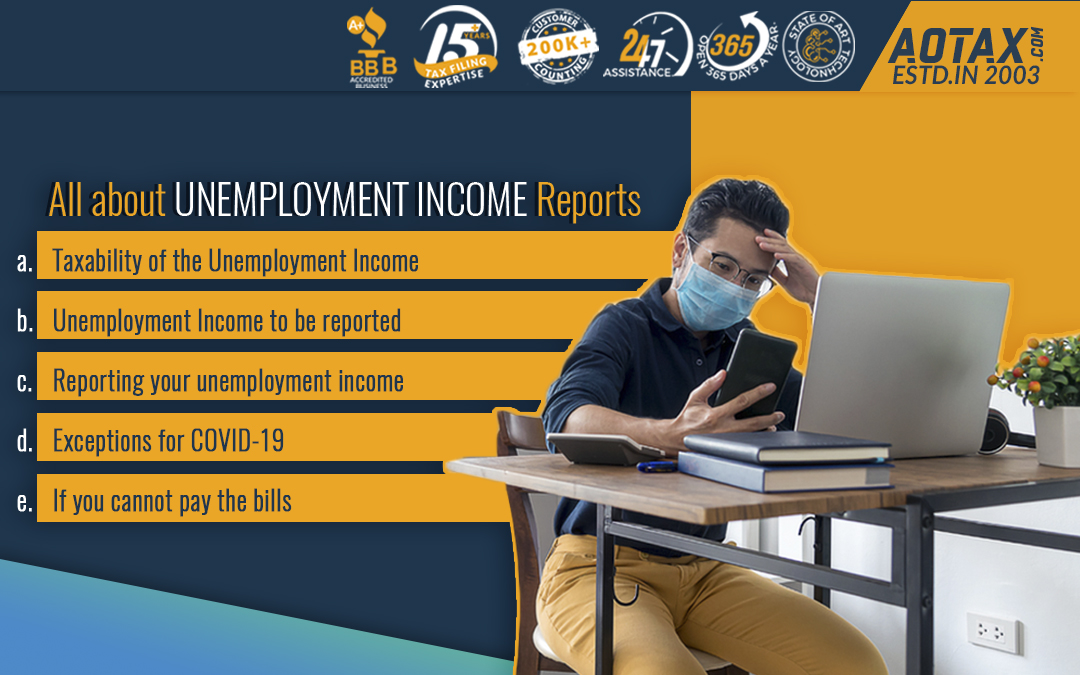
All about Unemployment Income Reports
The US economy has suffered from a great setback due to the pandemic COVID-19. Millions of Americans have either lost their jobs or have been furloughed. However, the US Government has started the initiative of providing several unemployment benefits for the affected Americans. These unemployment benefits are either a part of the CARES Act or are also sponsored by the State Government.
If you have been facing the problem of unemployment due to the pandemic and have received the unemployment benefits, then your taxes must have been affected. So, it is very important for you to understand how to report your unemployment income on your tax returns.
Taxability of the Unemployment Income
Unemployment income would be considered as an income and hence is taxable as per the laws. According to the norms of the IRS, the unemployment income or compensation obtained should be reported on the tax return of the year 2020.
The IRS and the Government want their cuts of the funds which you are receiving in the form of Unemployment income. Income is income and the source of income is not to be considered when it comes to filing your tax returns.
Unemployment Income to be reported
Before you start filing your tax return for the year 2020, you should be aware of the below-mentioned facts.
You must check out if you have been a participant involuntary withholding. If you have been a participant in the Voluntary Withholding, then you should have done it by filing the Form W-4V which denotes the Voluntary Withholding Requests. In case, you had filled out the Form W-4V then withholding of a flat 10% of your unemployment benefits would have occurred. This would mean that you have already paid 10% of your federal income taxes on your income earned due to unemployment.
In case, you are not making payment for the taxes of any of your unemployment income then a lump sum of your taxes would be paid while filing your tax returns. In such cases, the IRS would however offer payment plans by which you would be able to make the payment of your taxes.
Reporting your unemployment income
In your federal tax returns, you can mention the unemployment income which you have received under the Income Section. Before starting the process, one mandatory step is to receive Form 1099-G. This Form would help in highlighting the certain Government payments which have been issued by the State’s unemployment office and shows how much amount you have received as Unemployment Income.
You must keep that Form and match it to your own records which you have. Under the Income Section of your Tax return, the amount mentioned in Form 1099-G must be mentioned. Unemployment Income is usually reported in your federal tax return in Schedule 1 in the “Additional Income Section”. Then the full amount would be carried forward to the main Form 1040.
Exceptions for COVID-19
At this point, the IRS has clearly stated that there are no exceptions related to the taxes with respect to COVID-19. It has been stated by the IRS that you will have to pay the taxes related to unemployment on both the income received for unemployment from the State and also any extra funds if received from the Federal Government due to unemployment.
If you cannot pay the bills
In case you are not able to pay your tax bills on time you should not panic. You should not refrain from filing your tax returns due to this. It would be best for you to file your tax returns for the year 2020 even if you are not able to pay your bills on time. You would have to pay penalties in case of missing the tax return filing deadline.
You can contact the IRS and discuss the delay in tax payments. The IRS would help you by providing an extension in the tax payment, creating instalments in making the tax payment, or temporary late collection of taxes, etc.
Conclusion
Hence, reporting Unemployment income is a must for Americans and the given information would help understand the tax implications associated with Unemployment income.

Recent Comments